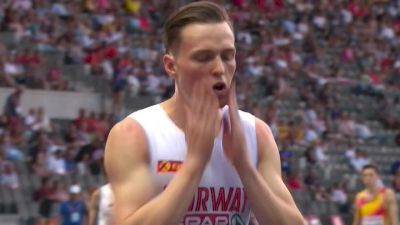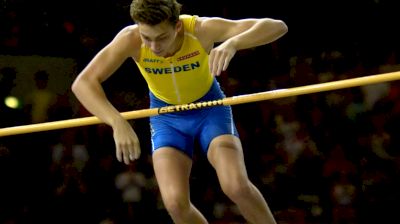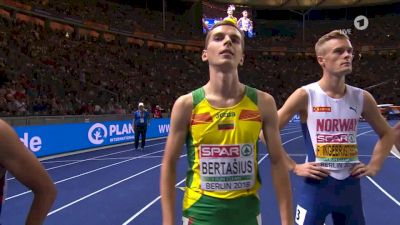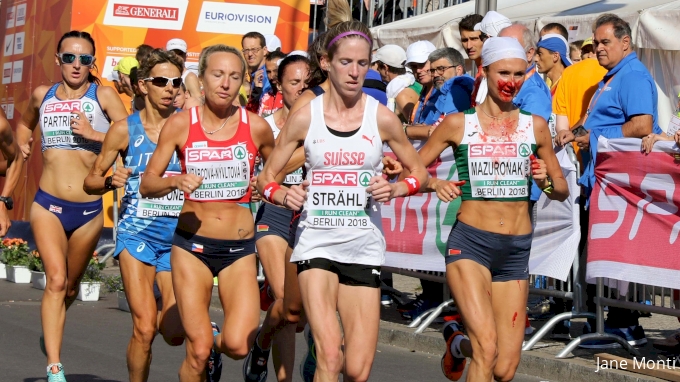Presenting FloTrack's 2018 European Championships Awards
Presenting FloTrack's 2018 European Championships Awards
Dina Asher-Smith's doubled, Jakob Ingebrigtsen's dominated the 1500m and 5000m and Mondo Duplantis went to new heights in the pole vault.

The times were fast, the stars were young, and the meet might have been the best in all of 2018. Let’s recap the 2018 European Championships by handing out some much-deserved awards.
Best Competition: Men’s Pole Vault
At 5.95m, Mondo Duplantis broke his own world junior record. In his next attempt, he became the 19th man in history to vault six meters. And with his clearance at 6.05m, he hit a mark that only three men in history have bettered.
Berlin on Sunday turned into the night that Mondo couldn’t miss. Those final three clearances (5.95-6.00-6.05) were the tail end of five straight perfect vaults that elevated Duplantis to the precipice of the world record. In a career that has been marked by one unfathomable achievement after another, this was a gigantic leap forward for the 18-year-old. Even an untrained eye could see that he had room to spare at 6.05 meters. His decision to stop after 6.05m elicited a sigh of relief to Sergey Bubka and Renaud Lavillenie, the owners of the outdoor and indoor world records.

Lavillenie himself was in Sunday’s competition, one of the men who played a supporting role to Duplantis and helped make it one of the best pole vault competitions of all time. Lavillenie needed a clutch clearance at 5.85m to stay in contention. Then, he went over at 5.95m. After a first attempt miss at 6.00m, he passed at the height to try and keep pace with Duplantis.
But it wasn’t just those two, four men were vaulting at six meters and three were still going at 6.05m.
Timur Morgunov cleared 6.00 on his first try. Lavillenie had two unsuccessful attempts at 6.05m, putting him in the bronze medal position. Morgunov, as excellent as he was, couldn’t match Duplantis. He missed three times at 6.05m, meaning his six-meter vault was only good enough for silver.
Best Individual Double: Dina Asher-Smith
There was tough competition in this category with the youngest Ingebrigtsen taking the 1500m and 5000m, but here’s what Britain’s Dina Asher-Smith did in individual events at the European Championships.
Two personal bests, two world leads and two gold medals.
The marks of 10.85 and 21.89 move her into select company, and her PR in the 100m makes it clear that she is a factor in that event. In previous global championships, Asher-Smith had focused solely on the 200m. Expect that to change next summer in Doha. In the 200m, there are only five women actively competing who have run that fast: Dafne Schippers, Shaunae Miller-Uibo, Allyson Felix, Elaine Thompson, and Tori Bowie. Of that group, Asher-Smith (22) is by far the youngest.
10.85 and now a 21.89 world lead!! Dina Asher-Smith secures the 100/200 double at #EC2018 pic.twitter.com/7voiQZiPPj
— FloTrack (@FloTrack) August 11, 2018
In both races in Berlin, Asher-Smith easily beat Schippers—the two-time world championship gold medalist in the 200m. And if she can do that against Schippers, well, it’s going to be tough for the rest of the world.
Best Double Attempt: Karsten Warholm
He didn’t get the 400 hurdles/400m double, but kudos to Warholm for giving it a shot. In an easier meet he could have coasted a bit in the hurdles, saving himself some energy for the 400m. But Yasmani Copello pushed Warholm to a personal best in the event and likely drained any hope he had at pulling an upset in the 400m the next day. He finished last in the 400m final on Friday, running 46.68. The 22-year-old leaves Berlin with incredibly sore legs and a PB in his best event. Not a bad week.
European champion, baby? pic.twitter.com/3V6dRIvH9p
— karsten warholm (@kwarholm) August 10, 2018
Best Family: Ingebrigtsens and Borlees
Here’s the tale of the tape for the Borlee vs. Ingebrigtsen matchup.
Borlees:
Kevin Borlee: 4x400m, gold; 400m silver
Jonathan Borlee: 4x400m, gold; 400m bronze
Dylan Borlee: 4x400m, gold; 400m semifinals
Ingebrigtsens:
Jakob Ingebrigtsen: 1500m, gold; 5000m, gold
Henrik Ingebrigtsen: 1500m fourth; 5000m, silver
Filip Ingebrigtsen: 1500m, 12th
This one is incredibly close. One on hand, you have a family comprising 75 percent of the fastest relay team in Europe. On the other, a family that put three men in a 12-person final in one event and a 1-2 finish in another.
As good as the Ingebrigtsens have been, we can say that their success was more of a surprise. By that I mean Jakob’s success was much more of a surprise because nobody is going to get used to a 17-year-old closing a 5000m in 54 seconds or controlling the front of a championship 1500m. He is the present and future and makes Mondo look old.

As for the battle of the Euro families, we’re calling this one a tie to be broken at the next installment of this meet. By then, I expect at least two more members of each family to be medal contenders.
Best Introduction: Daniel Bramble
This is solid work:
Best intros... @DevonAllen13 @LylesNoah + @Dbrambs_LJpic.twitter.com/DAMGh9dgK7
— FloTrack (@FloTrack) August 8, 2018
Especially when compared with this:
Rate that intro pic.twitter.com/fDkuOygAU0
— FloTrack (@FloTrack) August 12, 2018
Biggest Disappointment: Laura Muir and Sifan Hassan competing in separate events
This was as much the result of the scheduling (both the final of the women’s 1500m and women’s 5000m were on Sunday) than either athlete’s decision not to race against their biggest rival. The men had ample time to do both the 1500m and 5000m and I’m not sure why they couldn’t have made the schedule work for the women as well. It was, after all, a seven-day meet and the 5000m was a straight final.
Regardless, both dominated as expected. Muir made a big move in the middle of a race, running the final 800 meters in 2:05 to win in 4:02.32. It was a surge born out of complete confidence in her superiority over the field. In the 5000m, Hassan won by over six seconds though that margin is a bit skewed because her biggest challenger, Israel’s Lonah Salpeter, miscounted the laps and stopped momentarily with one lap remaining. She was running side-by-side with Hassan at the bell.
Biggest Upset: Sergey Shubenkov losing to Pascal Martinot-Lagarde in the high hurdles
Sergey Shubenkov looked like a lock entering the meet. He’d won the last 10 races he started and his last loss came at the end of May. In my pre-meet preview, I said (and believed) it was him against the clock in Berlin. After all, he wasn’t just winning races of late, he was dominating them by huge margins. He’d run under 13 seconds three times; the next fastest man on the year had run a 13.13.
13.17 ? Pascal Martinot-Lagard
— FloTrack (@FloTrack) August 10, 2018
13.17 ? Sergey Shubenkov pic.twitter.com/vEvdAo6Qn2
But he was off his best in Berlin and Pascal Martinot-Lagarde was able to take advantage. The Frenchman ran Shubenkov to a virtual tie, with both men finishing at 13.17. Ultimately, 0.002 kept Shubenkov from extending his winning streak as Martinot-Lagarde took the gold.
Best 2017 Throwback: Ramil Guliyev
Because the men’s 200m at the 2017 World Championship turned into an endless wave of scratches, the events eventual winner Ramil Guliyev was seen more as a victor of fortune. Justin Gatlin, Usain Bolt, and Christian Coleman didn’t want to run the 200m. Noah Lyles and Andre De Grasse were hurt. All that was left when the final rolled around was a tired Wayde Van Niekerk. So when Guliyev crossed the line in first it was natural to assume that we wouldn’t hear much from the man from Turkey again. That his role in track history would be playing spoiler to Van Niekerk’s attempt at the 200m/400m.
And even if you were discounting him this season while he rolled off wins in Oslo and Stockholm and a runner-up finish in Monaco to Lyles, it’s hard to look the other way after what he did at the European Championships.
Ramil Guliyev 1️⃣9️⃣.7️⃣6️⃣ #EC2018 pic.twitter.com/oz7uI1qckv
— FloTrack (@FloTrack) August 9, 2018
Only 17 men in history have run faster than his 19.76. Couple that with his gigantic margin of victory (20.04 was second place) and 2017 looks less like an aberration.
Biggest Effort: Volha Mazuronak
The Belarusian won the women’s marathon with a nosebleed. And not just any nosebleed, a volcanic eruption from her nose that produced this picture.

As David Monti of Race Results Weekly, described it, "Her face quickly became half-covered with blood, which dripped onto her uniform top. She tried multiple times to stanch the blood flow with tissues she was handed from the side of the road, and she repeatedly washed her face with bottled water.”
This would be horrible to have happen in the final mile of marathon, but Mazuronak’s nose gave out on her near the 10-kilometer mark—meaning she ran about 20 miles worrying about drinking fluids, her competition, and administering first aid to herself.